If you feel that your cat is particularly skinny to the point where you can feel their bones and you don’t know what the reason might be, it is understandable that you may be worried.
Be aware that unless your cat is overweight you will be able to feel their ribs, being able to feel your cat’s bones is not an indication that they are underweight.
If you have noticed extreme weight loss then there are several things you should look out for.
Extreme weight loss can be caused by things such as; dental issues, diabetes, parasites, hyperthyroidism, anxiety, hormones, age, gastrointestinal disease and cancer.
If you are particularly concerned we always recommend you consult a vet, keep reading to work out if you need to be worried and to rule out some possible causes.
Contents
How Thin Is Too Thin?
Not every cat is created equal. If you’ve ever thought “my cat is so skinny I can feel her bones”, this isn’t always a cause for concern.
There are many lean cat breeds that may appear to be underweight such as the Lykoi cat. For this reason, there is no universally correct weight that a cat should have.
If you have a kitten or teenage cat you shouldn’t worry too much either, cats that are not yet fully grown often take a while to grow into their frame.
A cat with a healthy weight has a small amount of fat at the base of her tail, a visible waistline right behind the ribs, and a slightly smaller area behind the ribs compared to the chest.
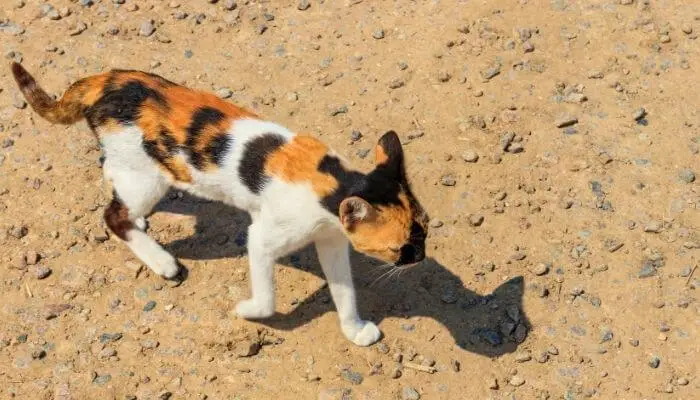
You should be able to feel your cat’s ribs but also a small layer of fat on their surface. You can feel the spine of a cat that has a healthy weight, but you should also feel that it’s covered in a layer of muscle and fat.
If your cat is too thin, the spine and ribs are visible even from a distance, without you needing to have to touch your pet.
The bones in the base of your cat’s tail can look like they are sticking out, and when touching that area, you will not be able to feel any muscle or fat covering them.
Thin cats have a highly visible waistline with clearly visible bones. Emaciated cats also have a significant tuck under their ribs.
You can’t tell if your cat is thin only by her weight. While the vast majority of domestic cats should weigh around 10 pounds, this number varies a lot from one cat to the next.
Maine Coons can be healthy at a weight of 20-25 pounds, while Siamese cats can be just as healthy and may weigh just 5-7 pounds.
Reasons Why your Cat May Be Underweight
Whether your cat’s weight loss has occurred as a result of a medical condition or not, you should know that it is abnormal for a cat’s weight to fluctuate a lot.
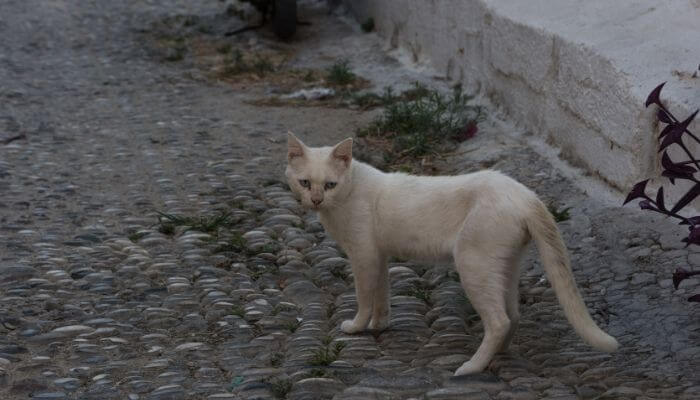
As a general rule, cats that don’t get enough food tend to drop weight gradually, but those that do suffer from a health issue will lose a lot of weight faster (sometimes over the course of just two to three weeks).
A skinny cat could be caused by a disease or a medical condition such as diabetes, cancer, gastrointestinal disease or hyperthyroidism.
Other possible causes include dental issues, stomach parasites, hormonal issues and aging.
1. Dental Issues
Cats that experience pain in their mouths, whether from a cavity, periodontal disease, or gum inflammation, will be reluctant to feed. They will therefore lose weight due to anorexia.
One example of infectious conditions that occur in unvaccinated cats is Feline Calicivirus, which produces not just respiratory symptoms, but also oral disease.
While many adult cats can recover from Calicivirus, many will develop recurrent oral issues.
2. Diabetes
Diabetes is very particular when it comes to weight loss. In this case, pet parents will notice that their feline friends do eat enough, and sometimes even more than they usually do, but they will still lose weight.
Since feline diabetes can be a life-threatening condition, if you’ve noticed that your pet has a voracious appetite and she’s still losing pound after pound, go to the vet clinic as soon as possible.
3. Internal Parasites
No matter the species they might be a member of, internal parasites can make a cat lose weight as they effectively steal the nutrients in their gut, so the animal is left with little to survive on.
Deworm your cat regularly, especially if she also goes outdoors on a regular basis. Some vets recommend deworming your cat every 3 to 6 months just to be on the safe side of things.
4. Age
Geriatric cats tend to be thinner than their younger counterparts.
Senior cats tend to require more care as they often develop chronic conditions that make it more difficult for them to digest and absorb the nutrients in the food they eat.
Make sure to take your feline buddy to the vet at least two to three times a year to prevent serious diseases in geriatric cats.
5. Hyperthyroidism
If your cat’s thyroid gland is too active, it can secrete too large amounts of hormones, which will both reduce your pet’s appetite and also make her lose weight.
Hyperthyroidism tends to affect older cats more than it does young animals. Your vet can prescribe the appropriate treatment and recommend you a high-calorie diet.
6. Anxiety
Cats are extremely sensitive pets, especially when compared to dogs.
They do not like changes. They thrive on set routines, whether they deal with your work schedule and the amount of time you spend with them or with their living environment.
So, if you’ve recently changed homes, taken your cat to the vet, or started working for several more hours per week, your pet can develop anxiety.
Lack of appetite is commonly associated with stress and anxiety, even in our feline buddies.
7. Hormones
Unneutered and unspayed cats can become skinny when they are in heat.
Neutering or spaying your cat can save them a lot of trouble and can even prevent some diseases (such as ovarian and mammary cancer), not to mention that they’ll feel less inclined to go outdoors and find other cats to mate with instead of wanting to be indoors and eat properly.
8. Gastrointestinal Disease
There are a variety of gastrointestinal conditions that can make it practically impossible for a cat to gain weight or maintain her healthy weight.
Any digestive issue that causes diarrhoea or vomiting is in this category, from inflammatory bowel disease to pancreatitis, food allergies, and even some infectious viral diseases, such as Feline Panleukopenia.
9. Cancer
Not all types of cancer can be associated with weight loss in cats, but some can.
In some cases, cats that have liver cancer can develop tumours that make it difficult for them to eat a lot, also due to the size of the neoplasm.
Gastric and oesophageal tumours, as rare as they might be in our feline friends, can also eventually lead to weight loss.
How To Help Your Cat Gain Weight
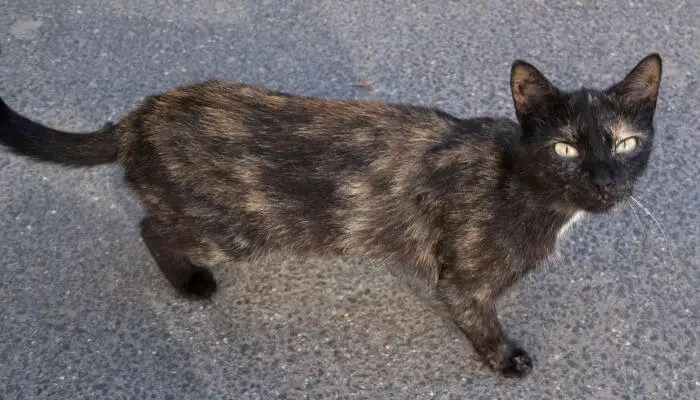
If you took your cat to the vet and none of the conditions that we have mentioned were diagnosed, then here are a few tips on how you can fatten up your cat:
1. Small & Frequent Meals
Cats tend to lose their interest in food if it’s left out for a long time. Dry cat food, in particular, loses its palatability after it’s been in the bowl for several hours.
If you are lucky enough to work from home, feed your cat small meals throughout the day and leave some kibble in her bowl only for the night.
2. Deal With Any Nervousness
Try to identify the stress or anxiety-inducing factors in your living space, or think of some creative ways to calm your cat down. If nothing works, you can use calming cat treats such as valerian or a pheromone diffuser.
If your cat loves catnip, you should consider giving her some at least until she gets used to her new living environment.
3. Deal With Food Competition
If you have several cats, one of them might not be able to get to eat enough, especially if the others tend to dominate her.
If this happens, you might have to set clear rules for which bowl needs to be used by which cat by simply rearranging them at mealtime.
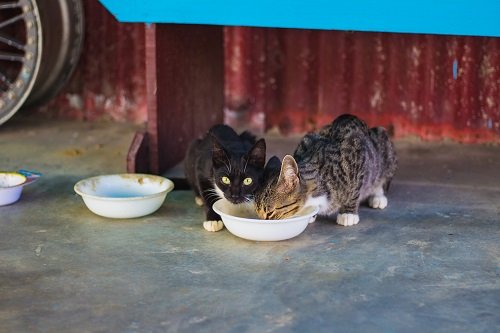
You can also protect your cat from having her meal stolen by shielding her with your body. Perhaps at one point, the others will understand that the thin one needs to eat, too.
4. Try Out Different Food Varieties
Some cats like specific brands better than the rest. Other cats will prefer dry food to wet food, although that rarely happens.
By the way, canned food is much healthier for our feline friends, simply because they don’t have a huge appetite for water anyway, so this is a good way of making sure they don’t get dehydrated.
You might go through some trial and error until you find the exact type of cat food that your pet prefers.
5. Heat Up The Food
If your cat were to be wild and hunt down a rodent, her prey wouldn’t be cold as if it were taken out of the fridge.
While some people recommend heating up your cat’s food in the microwave for 20-30 seconds, there is an even better method.
Simply put the food pouch into a cup and fill it with hot water.
Wait for several minutes and the food will warm up without it being too hot. You can use the same tip for cans, too.
6. Take Your Cat To The Vet
If nothing seems to work, even if your vet doesn’t seem to have found a diagnosis for your cat’s weight loss, it’s time to go to the vet clinic again.
Blood tests, such as a complete blood count or biochemistry, can reveal certain conditions that clinical examinations can never discover.
Additional tests such as ultrasounds, X-rays, an MRI or a CT scan might be necessary in some cases.
Conclusion
Weight loss in cats is a symptom, not a disease per se. This means that if your cat does suffer from one condition or the other, only a veterinarian can properly diagnose it.
If you are feeling concerned about your cat’s weight, it never hurts to go to the vet clinic.
Thin or fat cats aren’t necessarily healthy – learn how to make the difference between a cat that has a healthy weight and one that’s too thin.
In the end, you should try to make sure that your feline friend gets all the nutrition she needs and try to opt for the healthiest cat food variety (one with as few additives and artificial colours as possible) that you can afford.
As an Amazon Associate I may earn a small fee from qualifying purchases at no extra cost to you. This helps us run the site, so thanks for your support!

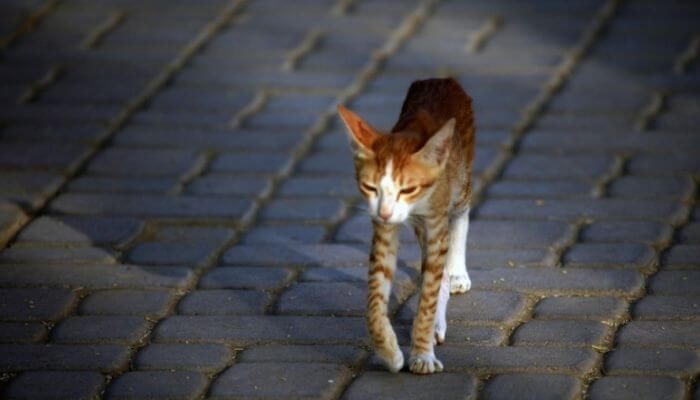
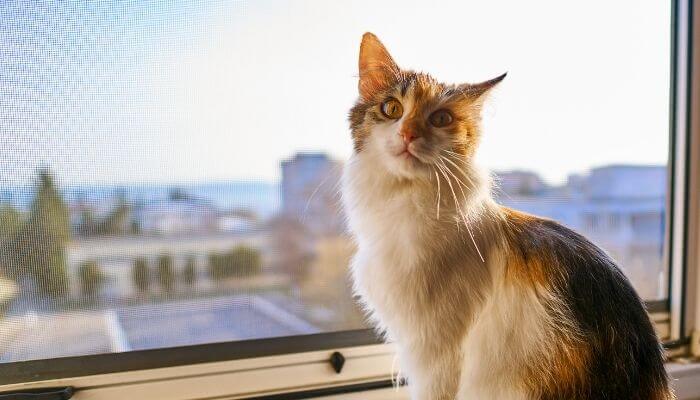

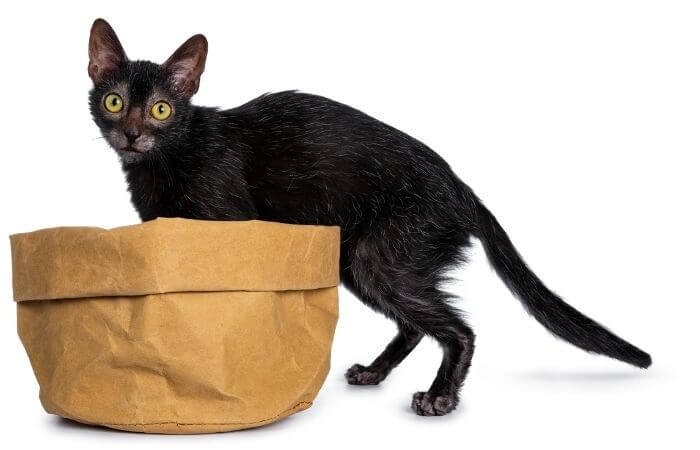

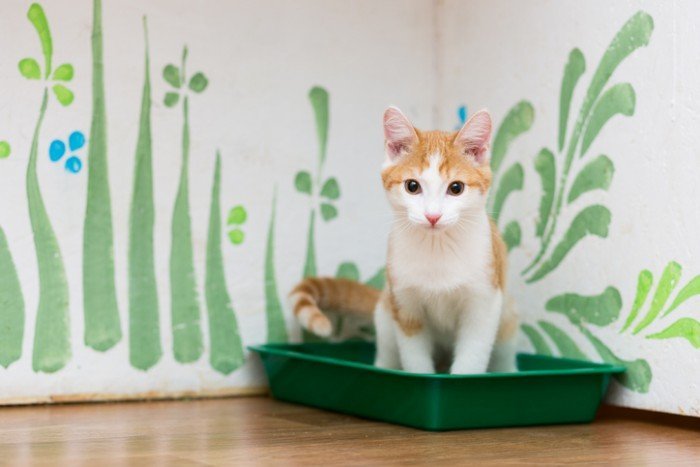

Leave a Comment